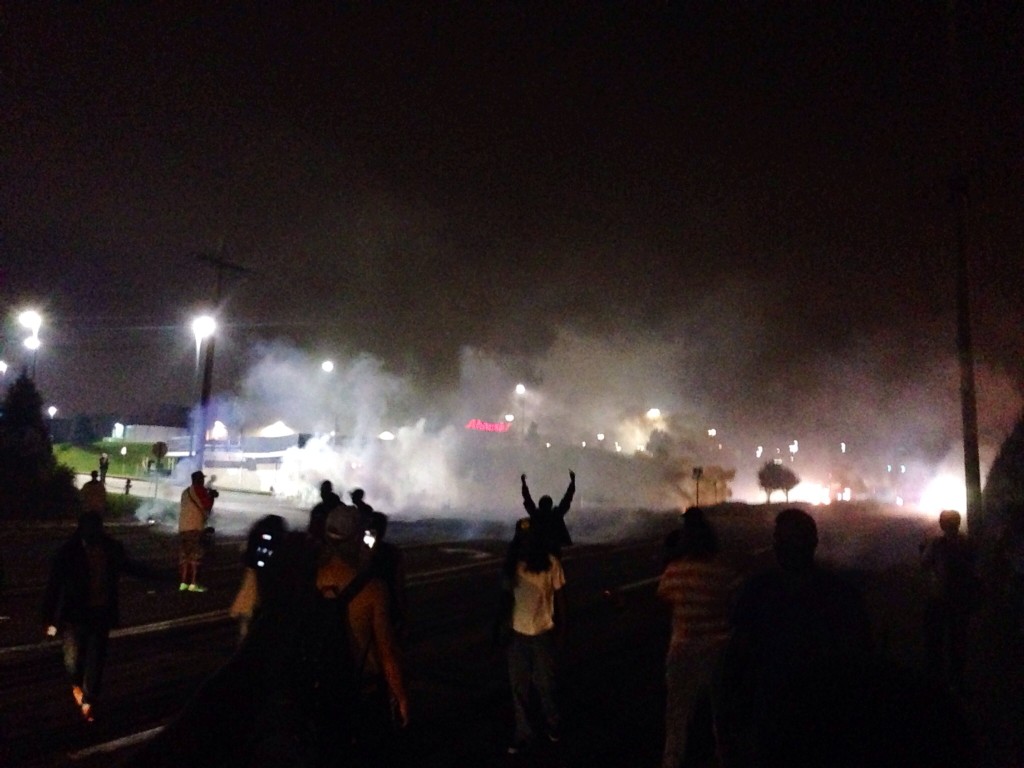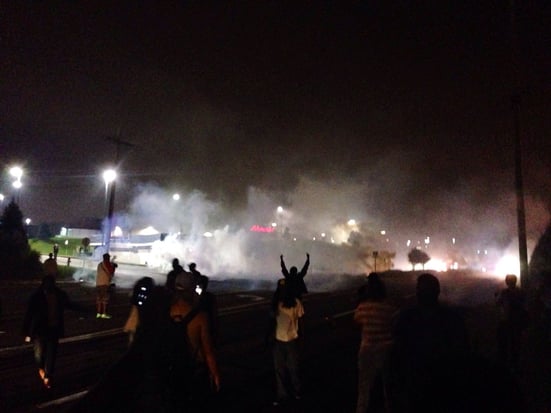
Editor's note: Jack Bates is a PhD student in historical theology at Wheaton College, studying the theology and practice of the early church to enrich the theology and practice of the church today. He visited Ferguson at the peak of the unrest and offers this reflection.
You could feel the fear in the air. You could see it in the eyes of the mothers in the crowd—young and old, clutching infant daughters and granddaughters to their chests. You could hear it in the faint tremulousness in the voices of angry teenagers, even as they shout “F--- the police!” in their bravado. It gives their swagger an edge of hesitancy, of uncertainty. The fear is obvious in the steely, seemingly-unfeeling gazes of the lines of police officers in their riot gear, uncertain about who intends for the protests to remain peaceful and who is intent that they don’t. This fear—of nearly everybody toward nearly everybody else, a fear intensely felt but carefully hidden—was my dominant impression of the situation in Ferguson while I was there this last weekend.
I have been closely following the news reports on Ferguson, and I think that most of the media outlets have missed this dimension of its atmosphere, a dimension I increasingly believe is crucial to understanding what is going on in the hearts and minds of that community. While I was in Ferguson, journalists mostly huddled behind police lines or inside the McDonald’s on West Florissant Avenue (which, when things got dicey, locked its doors to those of us trying to get to safety). At their most adventurous, reporters stood on the sidewalks as protesters marched by. It is no surprise, then, that so many of them—in their [detached objectivity? caution? fear?]—seem to have missed the palpable fear of the police and the protesters, a fear best perceived not by standing on the sidewalks but by trying to stand with the people.
That’s at least what I tried to do: to stand with the people of Ferguson as much as I could, to share in their mourning, their suffering, their pleas for justice. I did it as much as I could, as a white man from a whitewashed suburb of Chicago that lies 300 miles removed from the predominantly African-American St. Louis suburb of Ferguson. When police used tear gas on us to disperse our peaceful protest on Sunday night, I joined with them in their suffering. I even felt their fear—to a point. But there were facets of the experience of the people in Ferguson that I simply could not experience with them.
When the tear gas canisters started flying, I was surprised at the rapidity with which the crowds fled. Within minutes, a handful of young African-American men and I were all that was left of the protest march. I thought to myself, “So it’s tear gas. What’s the big deal? You just stay away from the gas clouds.” But as some of my fellow protesters had told me earlier, generations of residents had grown up in fear of what the police would do to them if they “stepped out if line.” White people tell their kids cautionary moral tales with witches and monsters as the villains. Many in Ferguson grew up hearing stories in which the police are the villains. Whether such narratives are fair representations of police in the Ferguson area is more than I can say. What is important is that the idea that the police are to be feared is deeply entrenched in the psyche of the African-American community in Ferguson. That is absolutely crucial to understanding what is going on there, and it is very difficult for many of us to understand.
For me, the worst abuse of police power I’d ever been exposed to has been a few unjustly-given parking tickets. And police in middle-white communities aren’t perceived as dangerous oppressors, but as comic figures: overweight, incompetent bunglers dusted with donut crumbs. Chief Wiggum on “The Simpsons” or Sheriff Rosco on “The Dukes of Hazzard.” When a police officer in my extended family shot himself in the foot at the gun range, our expressions of sympathy were peppered with chuckles, smirks, and knowing glances. He had played his part well. All this made it difficult for me to come to understand the importance of fear in the Ferguson protests and the police response.
But I’ve come to be convinced that a spiral of mutually-reinforcing fear and violence seems—to me, at least—to be at the heart of what has happened in Ferguson. When protesters are afraid of police, they respond violently to police in an attempt to gain some control of the situation to manage their fear. The police then become more fearful of the protesters and respond with violence and intimidation to gain control of the situation to manage their fear, which prompts greater fear and violence from the protesters, etc.
Consider the looting that has plagued Ferguson since Brown’s death. Looting may be the grief of the community acted out. It may be simply opportunism. A Ferguson resident suggested to me that looting is a sort of performative protest: Brown was accused of stealing, so the protesters steal in solidarity with him. People don’t really seem to know what to make of the looting, and the interpretations on offer leave a lot to be desired.
I’m convinced that the looting can be understood as a response to fear and an effort to manage it. The feeling inside the protest zones of Ferguson was that of an occupied territory. Lines of cops in full riot gear every block or two. Squad cars. Blockades. All this makes the people of Ferguson feel powerless, and feeling powerless in the face of a heavily armed and armored occupying force naturally engenders quite a bit of fear. Looting provides a sense of control over the situation and therefore helps them feel less afraid. Too intimidated and fearful of the police to risk a direct confrontation, looters win a “war by proxy” by committing a crime and getting away with it, thus showing that the cops’ power is not without limit.
But why that particular crime? If the temptation is to score one against the Law & Order crowd, why looting rather than jaywalking or defacing library books? Suffering tends to generate entitlement, making us feel that we are owed some compensatory good. And we are tempted to take moral and legal shortcuts when we are denied goods that we think we deserve. People suffering because of the brokenness of their community and the heavy hand of occupying police forces feel they are owed something. Looters not only get material goods they desire, but they feel the freedom from police control for which they long.
The escalating response of police forces in Ferguson likewise illustrates well the fear and violence spiral. Post-9/11, there has been a greater sense of danger, diffused through Americans in general but especially inculcated in our police forces. This greater sense of danger, further, was added on top of the previous increase in the sense of danger precipitated by “War on Drugs” rhetoric and policing techniques. An embattled police force that has been conditioned to view a subset of the population as enemy combatants in a “war” will take on a military rather than a “To Protect and Serve” mindset. Further, since the police have no surefire way of identifying who is an enemy combatant in this conflict, is it surprising that they will resort either to demographic-based profiling or to simply treat all civilians as likely combatants?
Psychologists tell us that the stronger an unpleasant emotion is, the more motivated we are to attempt to eliminate the experience of that emotion. The greater the feeling of injustice, the greater the feeling of fear, the more desperate we feel to normalize our emotional state, and the more desperate means we will be tempted to employ to achieve that. If our communities do not turn to looting, if our police forces do not turn to excessive force, intimidation, and militarization, it may not be due to the moral superiority of our communities, but simply because fear and desperation are not felt in our communities as they are in Ferguson. The heavier the hand of the police presses on the people of Ferguson, the more afraid and desperate the people become, and the more tempted they are to take increasingly desperate and violent action to alleviate their fear.
Nothing I’ve written above serves as arguments for the moral justification for the shooting of Michael Brown, his alleged theft and alleged assault of officer Wilson, the violent police response toward the protesters and reporters who have been peaceful, the violent protester response toward police, or the looting. My aim, instead, is to render these actions more understandable, because understanding promotes compassion, even—and perhaps especially—when we don’t agree with the choices others have made. I’m trying to get us to give the right answer to the question asked in the context of the Parable of the Good Samaritan: “Who is my neighbor?”
The people of Ferguson are feeling intense emotions, and ending the cycle of fear and violence will require police and authorities in the Ferguson area to build trust by seeking to understand these emotions. The police damaged this public trust by releasing information about Brown as a robbery suspect alongside evidence regarding his death. Many in the public (understandably) interpreted this as a claim and a threat: “Brown got what he deserved, and if you step out of line, the same might just happen to you.”When protesters in Ferguson declare, “I am Mike Brown,”they mean it. They are giving voice to their fear that, unless justice comes to Ferguson, they might become the next Michael Browns. The people of Ferguson need to hear that their complaints, their groans and cites for justice—not just for Michael Brown, but for themselves—are heard and taken seriously.
A common refrain I’ve heard in response to the events in Ferguson is: “Officer Wilson just did what any of us would have done.” My temptation has been to respond, “So what if he did just do what I would have done? I’m a crooked man with a crooked heart.”
But it is more important to see that such a refrain shows solidarity and empathy only with the white cop with the gun in his hand. Why not ask what we would want to be done to us if we had been Michael Brown? If I had robbed a convenience store, I would still want police to attempt to use non-lethal methods of neutralizing me. If Michael Brown were my kid, I would want him to have the chance for his deeply-troubled youth to become the prologue to the story of God’s restoring grace in his life, rather than being the final chapter. Wouldn’t we want this for ourselves, for our children?
It is very problematic only to empathize with the police and not the African-American poor in Ferguson. I hope that a greater understanding of the situation in Ferguson will lead those who participate and those who observe to a deeper love for all involved. For the distinctively Christian response to the events of Ferguson isn't “pro-police” any more than it's “pro-protester.” It's love. It's compassion. For all involved: police, protester, looter. For these are our neighbors.
Topics:
